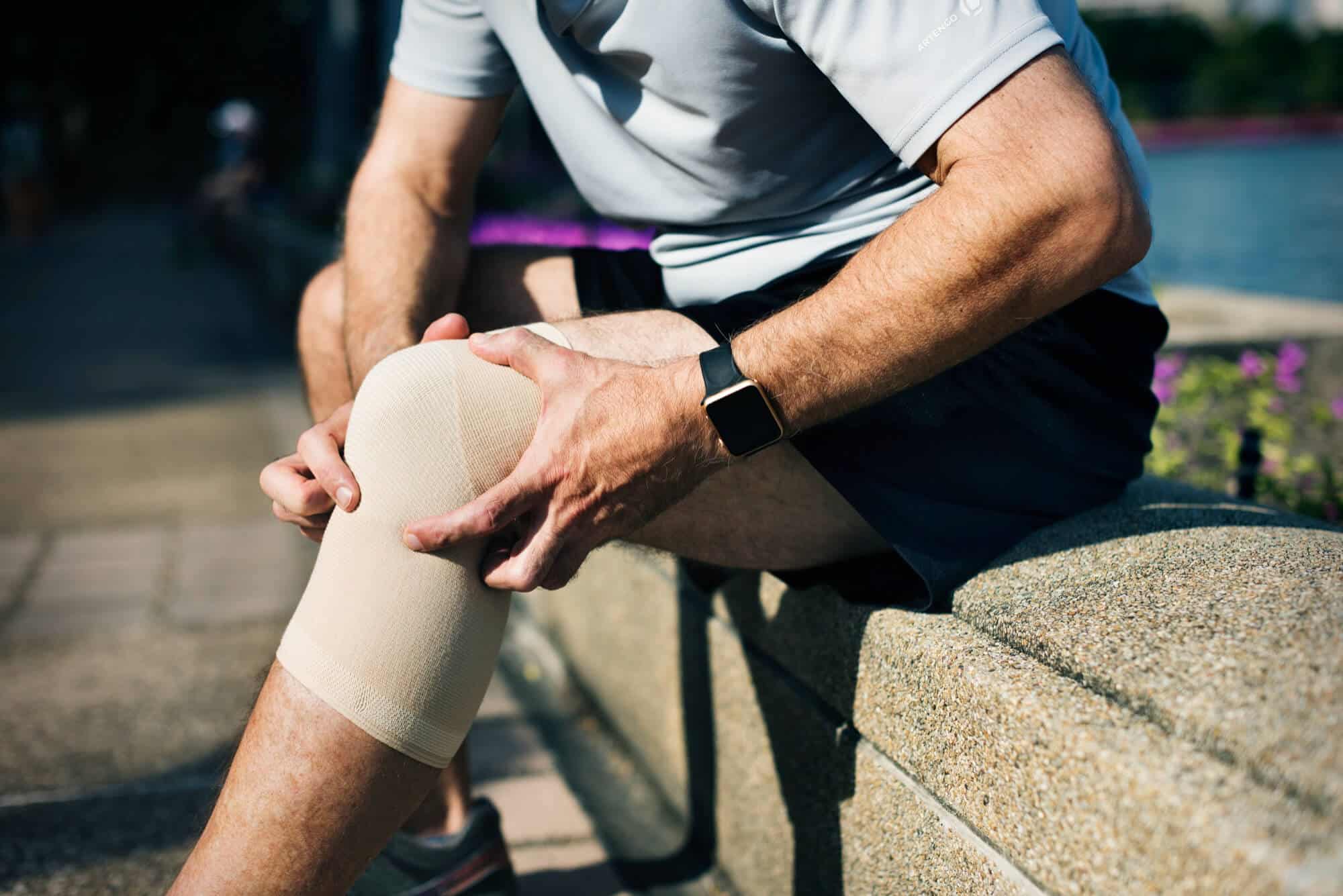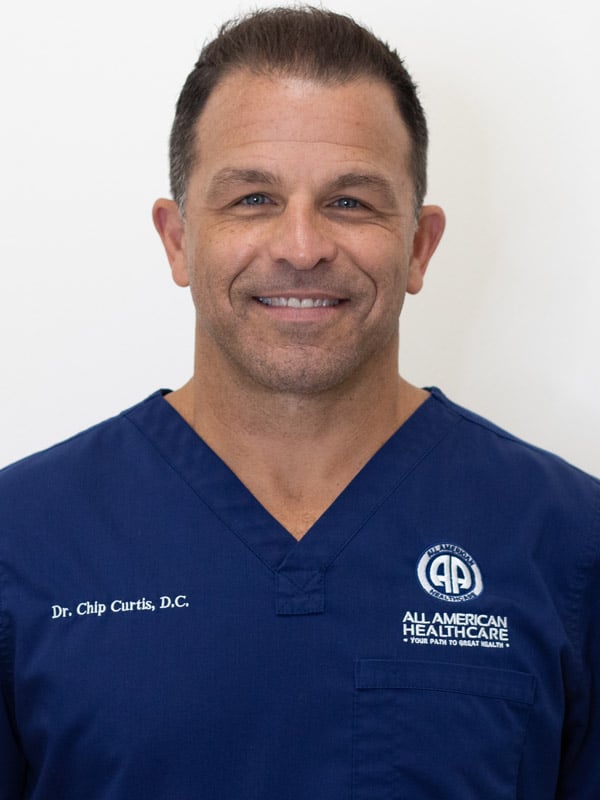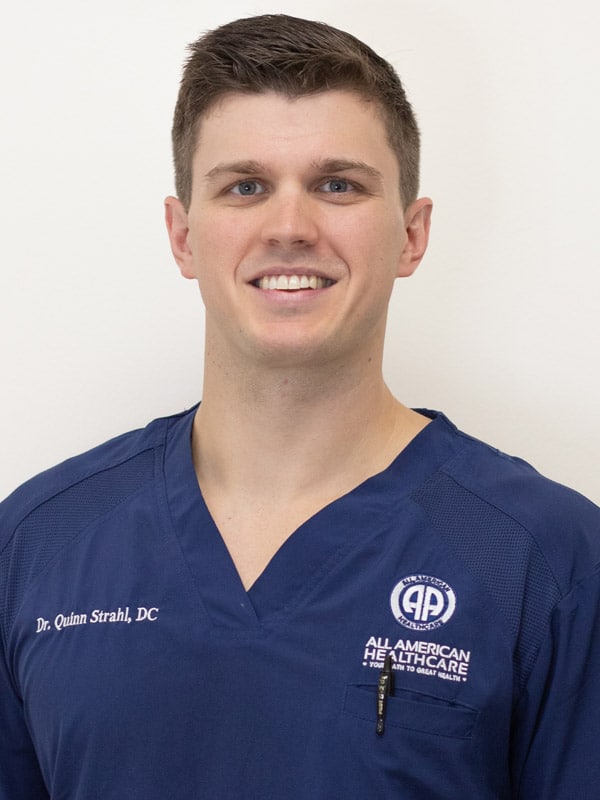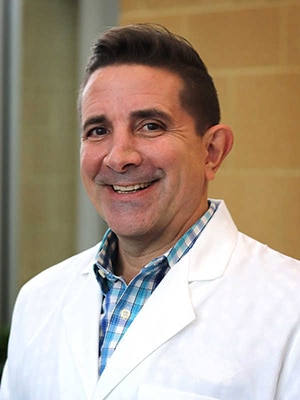Get natural Relief from Knee Pain in Covington and Hammond
Knee pain is a very common symptom that affects people of all ages. In most cases, the source of knee pain becomes clear after a thorough medical history and diagnostic evaluation.
At All American Medical, we will find the root cause of your knee pain and provide a treatment plan that helps your body heal and repair. Live without knee pain — naturally.

What are the causes of knee pain?
The knee is your largest joint. It absorbs and supports most of your body weight when you move, so it’s no wonder it is one of the most frequently injured joints. Knee pain is a common problem that can last briefly or become chronic.
A healthcare provider like the pain doctors and medical professionals at All American Medical should diagnose and treat this type of knee pain.
The location of the pain depends on what part(s) of your knee is damaged. You may feel pain in:
- The pain can be close to the surface, either above or behind the knee (it is usually a problem with your muscles, tendons, or ligaments).
- The pain can come from deeper, such as from the bones or cartilage.
- Multiple parts of the knee or leg can cause pain. Knee pain may radiate (spread) to other parts. Sometimes, you may feel pain in one area that feels like it is coming from your back knee. The pain can radiate from your knee to other regions, such as your thigh or lower leg.
Knee pain is a common problem that can be temporary. You might experience pain while moving or bending the knee, but it will subside when you rest.
Some people feel pain at different times of the day. When you first wake up, you may feel more knee pain. You may also experience knee pain in the evening, especially if your day is physically demanding.
Take a break from your physical activity and take OTC pain relievers to treat knee pain. If you feel pain that is so severe that it interferes with your daily activities or makes it difficult to move, it’s time to schedule an appointment.
All American Medical’s approach to Knee Pain Diagnosis
During a physical examination, one of our medical providers will:
- Check your knees for swelling, tenderness, warmth, and visible bruises.
- Test how far your lower leg can be moved in different directions.
- All the necessary orthopedic tests to evaluate and diagnose your condition.
Image tests
Almost every diagnostic evaluation at All American Medical includes X-rays to detect bone fractures and degenerative joints. Other imaging tests we might order include:
- Ultrasound: Ultrasound is a technology that uses sound waves to create real-time images around and within your knee. We will move your leg into different positions to check for specific issues.
- Computerized tomography (CT) scan: CT scanners use X-rays from different angles to create cross-sectional images of your insides. CT scans are helpful in diagnosing bone problems and even subtle fractures. Even when the joint is not inflamed, a special type of CT scan can identify gout.
- Magnetic resonance imaging (MRI): Using radio waves and a powerful magnetic field, an MRI creates 3D images inside your knee. This test is especially useful for detecting injuries to soft tissue such as ligaments and tendons. It can also reveal muscle damage.
Lab tests
If one of our pain specialists suspects that you have an infection or inflammation in your knee, they may order blood tests and sometimes even perform arthrocentesis. This procedure involves removing a small amount of fluid from your joint using a needle and sending it to a lab for analysis.
Common conditions and injuries behind Knee Pain
Knee pain has many causes. It is even more likely to occur if you’re overweight, and it can be caused by overusing your knee. You may also experience knee pain if you have a history of arthritis.
There are many common causes of knee problems, including:
Medical conditions that lead to Pain in the Knees
- Arthritis – including rheumatoid, osteoarthritis, lupus, and gout
- Baker cyst – A fluid-filled swelling behind the knee, which may also occur as a result of swelling (inflammation), such as arthritis
- Osgood-Schlatter disease
- Infection in or around the knee joint
Injuries and overuse that causes Knee Pain
- Bursitis – Inflammation caused by repeated pressure, such as prolonged kneeling, overuse or injury
- Tendinitis – Inflammation of a tendon caused by a change in activity or due to deconditioning tissue.
- Kneecap dislocation
- Kneecap fractures or other bone fractures
- Lliotibial band syndrome – an injury to the thick band running from your hip to your outside knee.
- Patellofemoral syndrome or pain around the kneecap and on the front of the knee.
- A torn ligament, such as a medial collateral ligament or anterior cruciate (ACL) injury, may cause swelling or bleeding in your knee.
- Meniscus tear – Pain felt inside or outside the knee joint
- Strain or sprain – minor ligament injuries caused by unnatural or sudden twisting
Knee Pain Treatments at All American Medical
The recommended treatment will depend on what is causing the knee pain. For more information, consult your doctor or a pain management specialist at All American Medical.
Medications
Your healthcare provider may prescribe medications to relieve the pain or treat conditions causing knee pain, such as rheumatoid arthritis and gout.
Physical Rehabilitation
Strengthening the muscles surrounding your knee makes stabilizing it easier. Depending on the condition causing your pain, your healthcare provider may recommend physical rehabilitation or other strengthening exercises.
Exercise can be helpful if you’re physically active or play a sport. They will help you correct movement patterns affecting your knees and establish a good technique for your sport or activity. Also, it is important to do exercises that improve flexibility and balance.
Arch supports with wedges placed on the heel can be used to shift pressure from the knee affected most by osteoarthritis. Different braces can be used in certain situations to protect and support the joint.
Knee Injections
At All American Medical, we are dedicated to cutting-edge regenerative medicine and may recommend injecting medication or other healing solutions directly into the joint. Examples include:
Hyaluronic Acid
Hyaluronic Acid is a thick fluid similar to the natural lubricating fluid in our joints. It is injected into the knee joint to reduce pain and improve mobility. Although the results of studies have been inconsistent, one or more hyaluronic acid injections can provide relief for up to six months.
Platelet-Rich Plasma (PRP)
PRP is a concentrated form of growth factors that can reduce inflammation and promote healing. Studies suggest that PRP injections may benefit certain patients with osteoarthritis, but further research is needed.
Alpha-2-Macroglobulin (A2M)
A2M is a protein that can be injected into the knee joint to help reduce inflammation and prevent cartilage breakdown. It functions by inhibiting the activity of proteases, enzymes that can damage the cartilage in the knee, making it a promising treatment option for osteoarthritis and other knee-related conditions.
Wharton’s Jelly
Wharton’s Jelly is a substance in the umbilical cord rich in mesenchymal stem cells. When injected into the knee joint, it can promote the healing and regeneration of damaged tissues. These stem cells can differentiate into various cell types, including cartilage, which can help reduce inflammation and stimulate the body’s natural repair mechanisms. This treatment has the potential to provide long-term relief from knee pain.
Make an appointment or call us for more information on these therapies and medical procedures.
How to prevent Knee Pain
It’s possible that you won’t always be able to prevent knee pain. This is especially true if the injury is unexpected, but you can make several adjustments to prevent or mitigate painful joints.
Staying safe while physically active is the best way to avoid pain. This is especially true when playing sports or doing other physical activities.
- Wear the appropriate protective equipment.
- If your knee hurts after or during physical activity, don’t “play with the pain.”
- Rest and recuperate your body after an intense workout.
- Warm up by stretching before you play sports or work out.
- After physical activity, cool down and stretch.
Reduce your risk of injury by following these safety tips:
- Keep your workspace and home free of clutter that may trip you or others.
- Use the right tools and equipment to reach your home items. Never stand on a chair, table or countertop.
- If you find walking difficult or are at a higher risk of falling, use a cane or walking aid.
Home care for Knee Pain
When you manage your symptoms, simple causes of knee discomfort often resolve on their own. Contact your healthcare provider if you believe knee pain was caused by an injury or accident.
If you have just begun to experience knee pain and it is not severe, you can:
- Rest and avoid painful activities. Avoid putting weight on your knee.
- Apply ice. After the first day, apply it four times a day. Before applying ice, cover your knee with a soft towel. Avoid falling asleep when using ice. If you leave it on for too long, you can get frostbite.
- To reduce swelling, keep your knee as high as you can.
- Ibuprofen or naproxen can relieve pain and swelling but can slow down the healing process. Acetaminophen or Tylenol can relieve pain but not swelling. Speak to your healthcare provider before taking these medications if you are experiencing medical problems or have been using them for longer than two days.
- Sleep with a cushion under or between your legs.
General tips to relieve and prevent knee problems:
- Warm up and cool down before and after exercise. Stretch your quadriceps and hamstrings in your front thigh.
- Instead of running downhill, walk instead.
- Swim or bike instead of running.
- Reduce your exercise.
- Instead of running on pavement or cement, run on a smooth, soft surface like a track or trail.
- If you are overweight, try to lose weight. Every extra pound (0.5 kg) you weigh puts an additional 5 pounds (2.25 kg) of pressure on the kneecap when climbing stairs. When you jump, the pressure on your kneecap is even higher. Ask your provider for help losing weight.
- Orthotics (special shoe inserts) and arch supports can help with flat feet.
- Check that your shoes fit properly, are comfortable, and cushioned.
The cause of knee pain may determine the next steps you need to take.
Contacting a medical professional
If you are experiencing severe pain or have a deformed or distorted knee, seek immediate medical attention by calling 911 or visiting your nearest emergency room.
Contact All American Medical or your healthcare provider if:
- Your knee cannot support any weight.
- Even when you are not carrying weight, you still feel moderate pain.
- You may experience a locking, clicking, or buckling of your knee.
- Your knee cannot be flexed, or you will have difficulty straightening it out.
- You have a high fever and experience redness, warmth, or swelling around your knee.
- There is swelling, numbness or tingling in the lower leg below the painful knee.
- You still have knee pain even after three days of home treatment.
Don’t wait for the pain to become severe; contact us today, and we will get you back on the road to full recovery.
For questions about Treatments for Knee Pain or to make an appointment, please contact our Covington clinic at (985) 893-2223 or our Hammond clinic at (985) 350-6110.
All American Medical’s Pain Relief and Mobility Experts
Covington Knee Pain Relief Team
Dr. Curtis and Dr. Strahl lead our experienced Covington Knee Pain team.



Hammond Knee Pain Relief Team
Dr. Siecsnyadre and Dr. Dericks lead our expert Hammond Knee Pain team.



